“When I started the Passage, I didn’t know if anyone would even want to publish it – coz publishing hates it when you do something different…and I just jumped the tracks completely.”
Bestselling author of
The Passage series, Justin Cronin, was recently in Auckland, and I headed along to the event evening to hear him talk about his latest book,
The City of Mirrors. It started with drinks and nibbles, and while I didn’t have an author-meet-buddy with me, I shared a sentence or two with the person next to me (who liked my Harry Potter phone cover).
After a brief introduction from the local librarian (in whose library we were currently sitting), Justin Cronin appeared, and the first thing this Texan said was
“Hey, ya’ll”
You can’t get much more Southern American if you tried.
Instead of launching right into the history of his life or anything about himself, he opened The City of Mirrors, and read an excerpt because “it’s nice to be read to”. One of the things he did comment on before he started reading was how, while the entire series up to this point had been written in third person, he really felt that Fanning’s story, where it all began, needed to be told from Fanning’s perspective. It was this, the beginning of the viral vampire-like world, that he read aloud.
After the reading, it was Q&A time, and, like a most of these sorts of author events, the questions were ones that you would expect – I guess no matter the author, people are still interested in the same things, still want to know what this author does, how this author is different. While I myself didn’t have any questions – I tend to let other people do the talking – I recorded some of the Q&A on my phone and tried my best to condense it down for you guys. These questions are worded to the best of my memory-ability.
Why did you become a writer? Did you always want to be one?
“I became a writer because I forgot to apply to law school … That’s what everyone assumed I’d do, so I just kept trying to avoid it. And I had enough success as a writer to keep on going.”
I love this. Not only is it funny, but I love the idea of avoiding that which people think you’re going to do. Surprise career moves, apparently, are worth it.
 |
| Justin Cronin. Photo by me. |
How did the story come to you?
In 2005, when his daughter was 8, they spent 90 days, an hour after school, he would run and she would bike. To pass the time, they told each other stories. 90 days went by, and there was another book that he was supposed to be writing, that he wasn’t really. So he typed up some of the notes that he had on the story he and daughter talked about, and it ended up being 30 pages long.
“And so I decided I’d write the first chapter, just to see how it felt, how it sounded – did it have a voice?” He said that every story needs a voice, otherwise it’s just a bunch of information and facts in order. You need an entry point. “And I wrote the first sentence, and never stopped.”
So did his daughter get any of the royalties? Of course not. “But I get to send her to college … and I bought her a pony.”
What is your work process? What does a day look like for you?
The general day for him begins at 9am and goes until 3pm. Justin explained that the amount of words per day totally depended on where he was in the story. But a general rule for words-per-day was 1,000 (makes my NaNoWriMo’s 1,667 per day seem a tad daunting even after doing it for 3 years). He’d then have word counts and goals he needed to get done for the week, the month, and deadlines to meet.
Of course, those deadlines often came and went and weren’t met, but, he said, in 10 years time, he’s not going to remember whether or not he made the deadlines; he’ll remember that he finished the book.
As you wrote, did you make discoveries along the way into what the story would be?
Cronin outlines extensively, he told us. “I had a very very strong plan going in. I knew who my characters were, and how they were going to end up. I knew the end of the third book long ago, I knew the last sentence of the third book in 2007. Which I had to, I really need to know how something’s going to end. If I don’t know how it ends, it’s not writable yet … There were deviations but mostly I adhered to the plan.”
And his tip for working with a plan? “Don’t get too far away from it, but have a good time.” And that’s how get describes his process.
 |
| My signed book, and the free tote bag I received for being in the first 30 people to RSVP. Photos by me. |
Is that than, how you describe genre? With your outline?
“I was aware of the tropes*, but I was also doing what you have to do when you work on an established tradition which is put your spin on it.” Cronin said he wasn’t interested in writing a traditional gothic vampire story, but wondered what it would be like if the sort of magical element was taken out of it. What if it was a disease centuries old?
“I never thought of this novel as a horror novel.” If anything, he said, it’s more like a Western than anything else. In terms of mechanisms, getting the characters from this place to that, getting them on the road. “One of the great, enduring motifs of American literature is the encounter with sublime beauty and danger of the American west. And that’s exactly what happens to that group of people when they leave First Coloney.”
When people asked me as I was reading this series about the genre, I never quite knew what to say. But after hearing that Cronin didn’t really know either/wasn’t too bothered about the typical genres, I take comfort in that and my fumbled answers to their seemingly simple question.
“I was always aware of a lot of tropes and genre features operating and that was fun,” he said. There’s a difference between genre and formula fiction. Formula fiction is when the author gets outline from the publisher that something must happened every 10 pages. There are books that formulaic like this, and that’s fine, he says, “but the only people who are going to like that, are people who like that.”
*trope: a significant or recurrent theme; a motif
Is there a movie?
“No,” he said, without the slightest hesitation. “They couldn’t do it. It’s too big.”
And I totally hear him on this one. There is no way you could make a movie out of this book – even just the first one. You couldn’t do it. There are too many characters, too much going on, and you can’t take out a character and still have a functioning, good story. Every character is vital because they’re all connected. They all impact each other, it’s a web.
But (and here’s the good news), it looks like a TV series is a-go. There have been a couple of hiccups along the way, but it’s looking like there’s a TV deal, through Riddley Scott’s company.
Television is incredible at the moment, and everyone has ‘a show’. There are fantastic writers in TV at the moment, as Cronin pointed out, and he’s right. TV is where it is at. There’s just something about a TV show that’s so much better than a movie, especially with the incredible shows that are out there at the moment, and have been popping up for the past couple of years. Fingers crossed that the TV deal for The Passage series goes ahead, because it would be incredible.
 |
| Me with Justin Cronin. My photo, taken by the lovely person at the library. |
There’s a character at the end of the book, and if you’ve read it you’ll know (no spoilers, don’t worry), how could easily have further stories. So why is Cronin adamant he’s not going to tell it?
“Because I really want to let something breathe. A great writer said that you should always stop the story before it ends. Let something go past it, and I like that.”
He knew what would happen to all the characters, but not this last one, and so he couldn’t pick. There’s no ending to give him, nor further story to tell.
And that was that. There was talk that he might write some novellas, telling some of the other character’s stories, but for now Cronin wanted to leave this world for a little while, and while that is a little sad, we look forward to future stories from this great author.
*********
It was a great evening, and I really enjoy heading out to events like this. It's fascinating to see and hear about an author's thoughts and processes behind their works. If you have the opportunity to go and hear an author speak on their book/s, do it. It's a lot of fun.
















![The Tower's Alchemist (The Gray Tower Trilogy Book 1) by [Escobar, Alesha]](https://images-na.ssl-images-amazon.com/images/I/5154HdOybnL.jpg)





